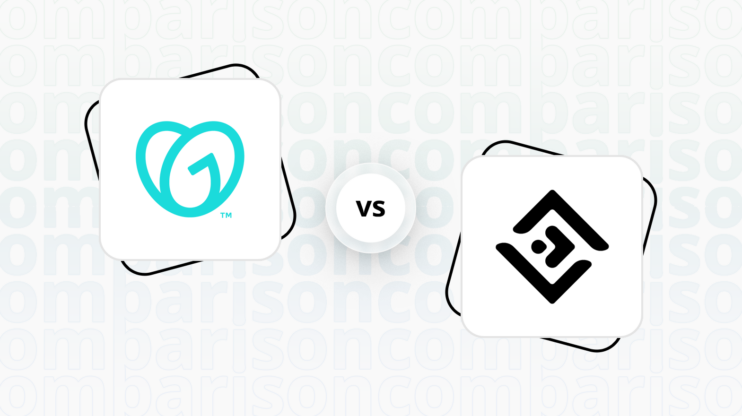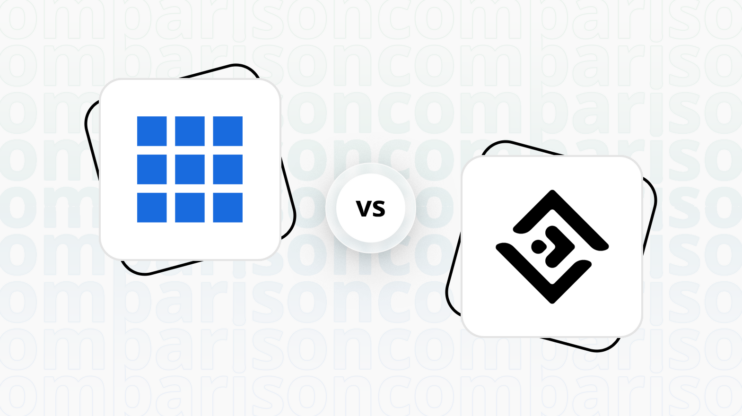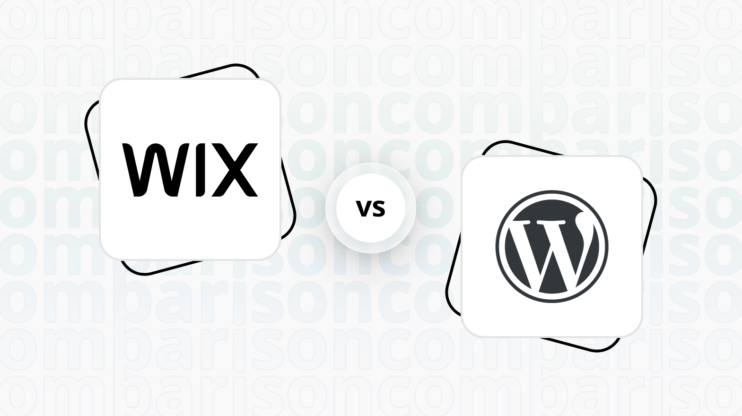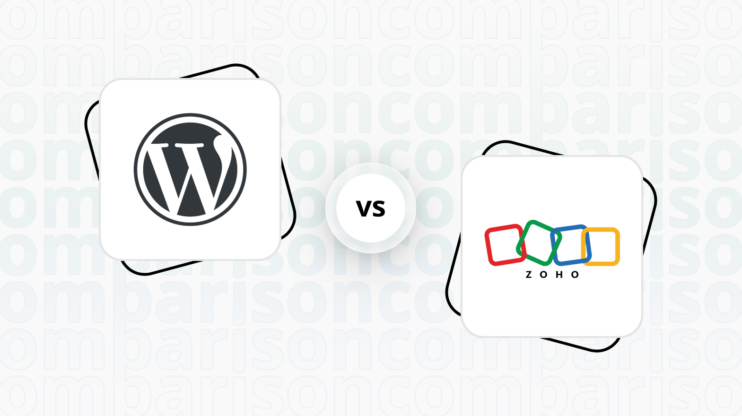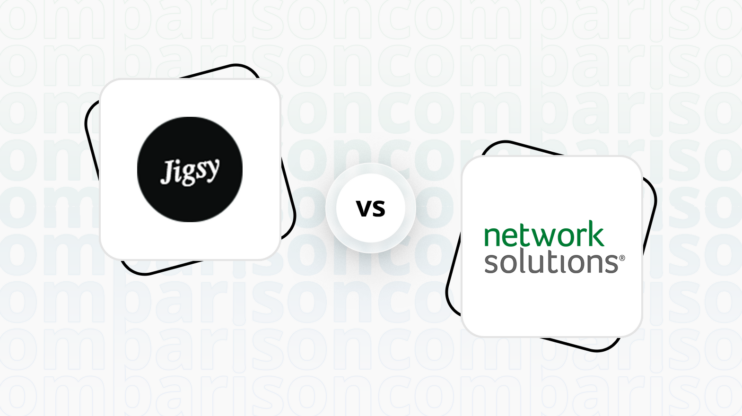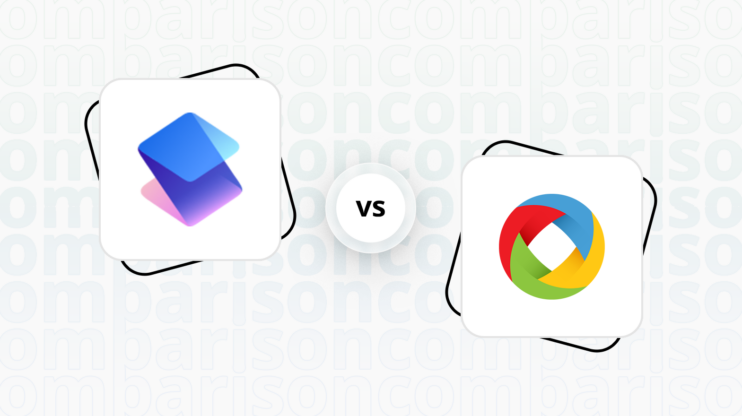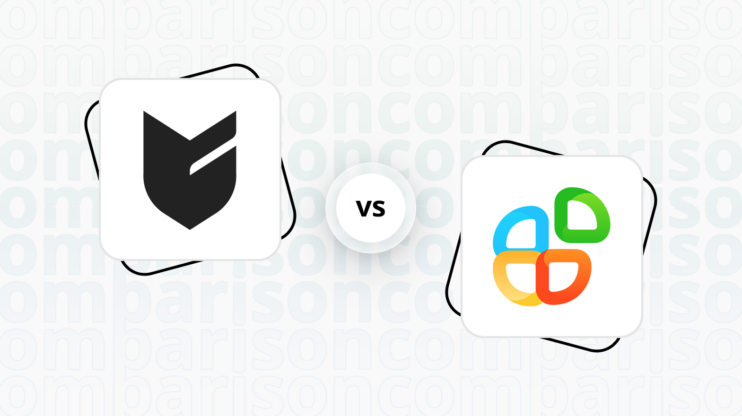Final verdict
GoDaddy and BlueHost offer robust solutions for website building and hosting, but they excel in different areas.
-
GoDaddy (Overall Grade: 7.5/10)
shines with its user-friendly website builder, comprehensive ecommerce features, and strong customer support. It’s particularly suited for users looking for an all-in-one platform that combines ease of use with a wide range of functionalities, including domain registration, web hosting, and online marketing tools. GoDaddy’s emphasis on security and AI capabilities further enhances its appeal to businesses of all sizes. -
BlueHost (Overall Grade: 6.8/10)
, while slightly trailing behind in the overall score, stands out for its seamless WordPress integration, offering access to a vast array of themes and plugins. This makes it a great choice for users who prioritize customization and control over their website’s design and functionality. BlueHost’s managed WordPress hosting and focus on website speed and security are key advantages for users looking for reliable and efficient web hosting solutions.

|

|
|
|---|---|---|
|
Design functionalities & templates |
8.0 |
7.2 |
|
Ease of use |
8.2 |
8.2 |
|
Ecommerce |
7.2 |
6.8 |
|
Website Editors |
6.7 |
7.3 |
|
Product testing options |
8.1 |
6.2 |
|
Price |
7.9 |
7.2 |
|
Hosting quality |
7.8 |
8.0 |
|
Website speed optimization |
7.6 |
6.5 |
|
Plugins and integrations |
7.3 |
9.1 |
|
Marketing features |
7.3 |
7.3 |
|
Customer support |
8.5 |
7.6 |
|
Security |
6.8 |
8.3 |
|
AI capabilities |
7.5 |
1.5 |
|
User Management |
7.3 |
4.4 |
| Overall |
7.5 |
6.8 |
Best for ecommerce
 7.2
7.2
 6.8
6.8
Verdict
: GoDaddy and BlueHost both offer solid ecommerce solutions, but GoDaddy’s user-friendly features make it slightly more appealing for those new to online selling, while BlueHost shines for those seeking deeper customization through WordPress.
-
GoDaddy
: With a focus on simplicity and ease of use, GoDaddy is well-suited for small businesses looking to quickly set up their online store. Its ecommerce features are comprehensive for beginners, though it may lack some advanced customization options. -
BlueHost
: Ideal for users who are comfortable with WordPress, BlueHost offers a more customizable ecommerce experience. It’s particularly strong in product page customization and has the edge for businesses looking to scale or require specific integrations.
Best for informational & business websites
 7.9
7.9
 7.5
7.5
Verdict
: GoDaddy slightly edges out BlueHost for informational and business websites, thanks to its higher score and robust design functionalities.
-
GoDaddy
: With a score of 7.9, GoDaddy stands out for its comprehensive platform that includes a user-friendly website builder, a vast array of templates, and additional services like domain registration and online marketing assistance. It’s designed to cater to a wide range of needs, making it a versatile choice for informational websites. -
BlueHost
: Scoring 7.5, BlueHost is a strong contender, especially for users who prefer WordPress. It offers a seamless integration with WordPress, allowing access to thousands of themes and plugins. While it provides a solid foundation for informational sites, it slightly lags behind GoDaddy in terms of overall suitability for this category.
Detailed comparison
Design functionalities & templates
Design FunctionalitiesRepresents how well each platform allows for creative design and customization of websites.Score Components:
- Template Variety (30%): Range and quality of design templates.
- Customization (30%): Flexibility and options for design alterations.
- User Interface (20%): Ease and intuitiveness of the design process.
- Responsiveness (10%): Adaptability to different devices and screen sizes.
- Innovation (10%): Unique design features and tools.
 8.0
8.0
 7.2
7.2
🏆
Winner: GoDaddy.
If you’re looking for a platform that offers more creative control and a wide array of design features, GoDaddy is the preferred choice.
GoDaddy provides an extensive collection of over 1500 website templates catering to diverse industries and design preferences. These templates cover business, ecommerce, creative, personal, and non-profit sectors, offering various styles such as modern, classic, bold, minimalist, and content-focused. With customization options, mobile responsiveness, and a combination of free and premium templates, GoDaddy aims to meet the needs of users seeking versatile and visually appealing website designs.
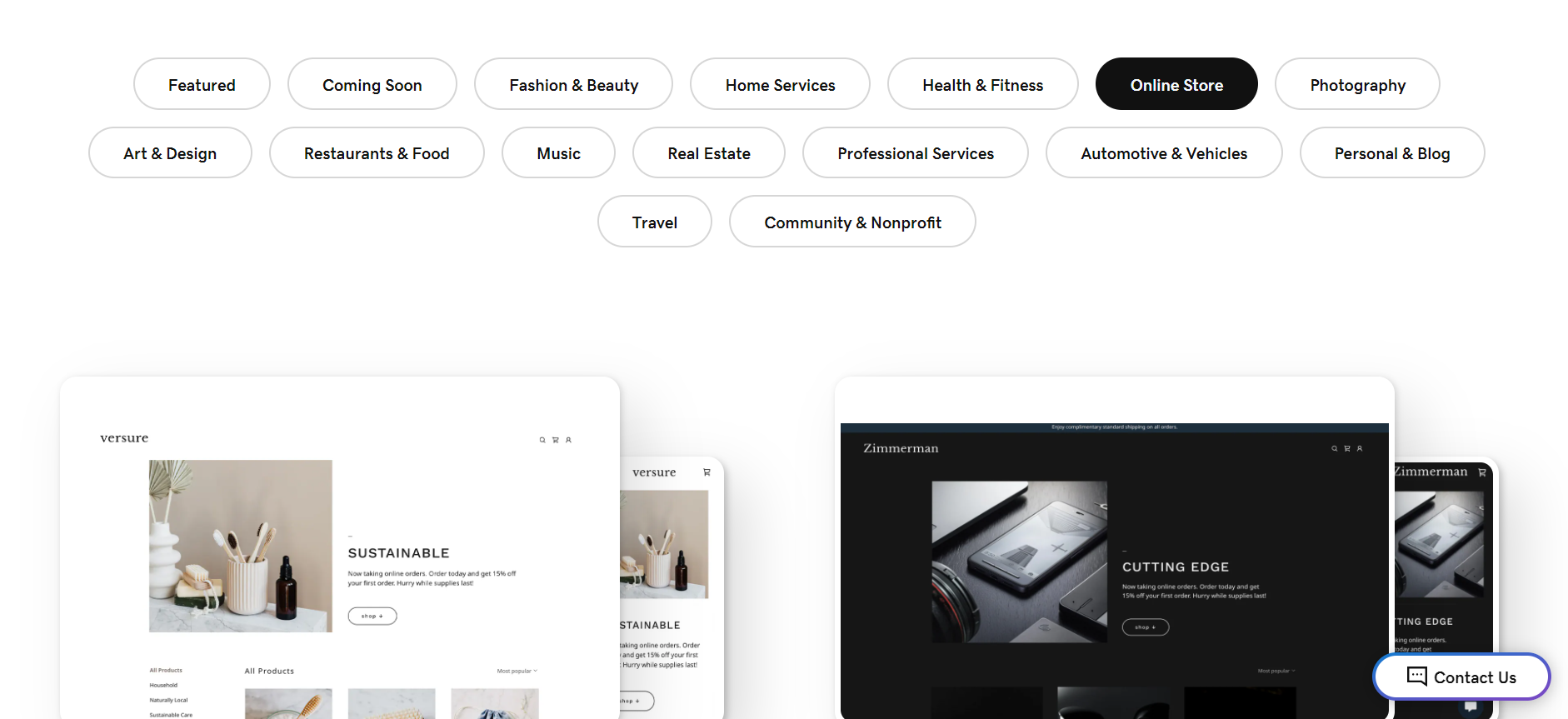

Compared to GoDaddy, BlueHost’s WordPress website builder offers over 300 pre-installed templates and designs to cater to the diverse needs of its users, ensuring that there’s something for everyone, regardless of the niche or industry. With hundreds of customizable templates available, users can easily find a design that aligns with their vision and brand identity. These templates are designed to be responsive and SEO-friendly, enhancing the user experience and visibility of the websites. From simple blog layouts to complex ecommerce designs, BlueHost provides a comprehensive selection to help users create professional-looking websites with ease.
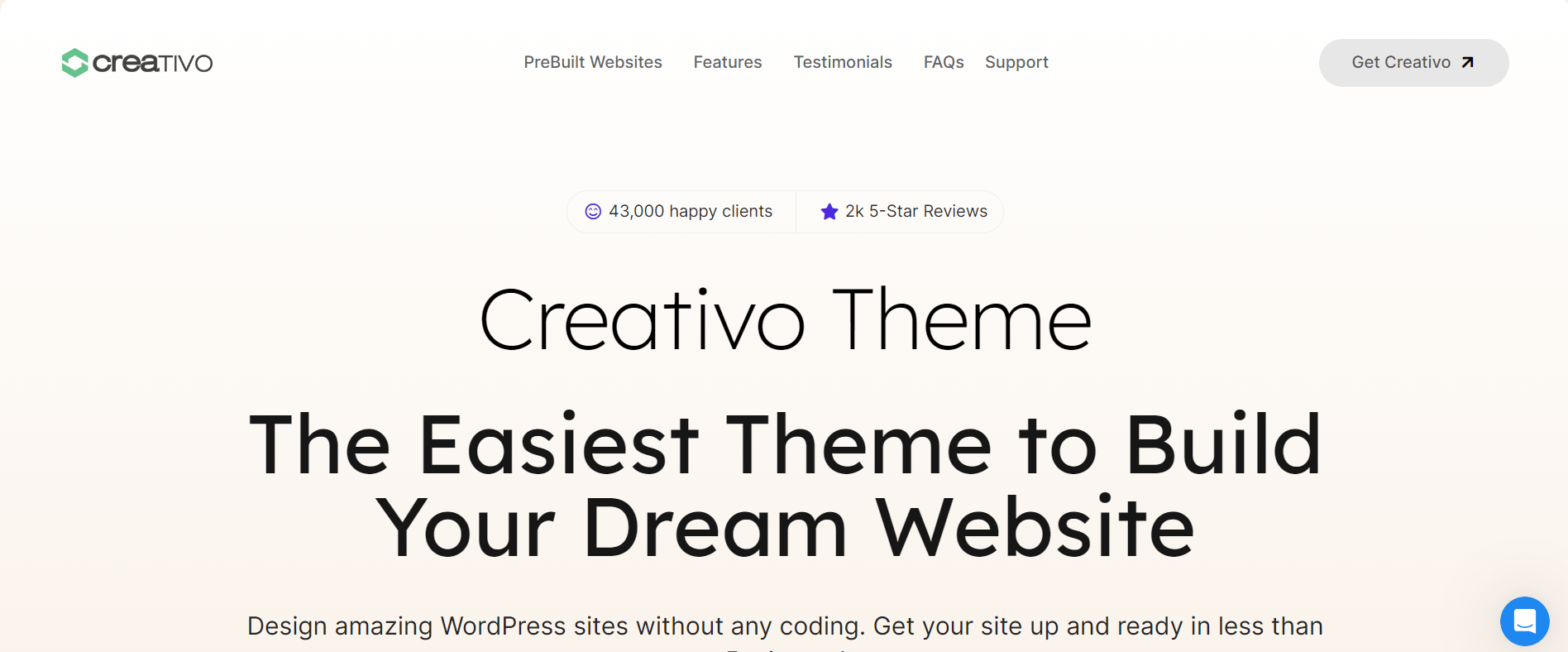
Get a head start on website creation with AI
Create a custom website tailored to your business needs 10X faster with 10Web AI Website Builder!
Ease of use
Ease of useReflects the platform’s overall user-friendliness.Score
Components:
- Learning curve (40%): Quickness and ease of getting started.
- Interface design (30%): Simplicity and intuitiveness of layout.
- User guidance (20%): Quality of tutorials and support.
- Flexibility (10%): Adaptability to various user skills.
 8.2
8.2
 8.2
8.2
🏆 Winner: Tie
. Both GoDaddy and BlueHost scored an 8.2 in ease of use, making them equally user-friendly. GoDaddy is popular among beginners due to its drag-and-drop interface and easy domain registration, while BlueHost offers a simple, section-based drag-and-drop interface that simplifies website creation.
Learning Resources
🏆 Winner: BlueHost
. While both platforms offer solid learning resources, BlueHost goes a step further with its WordPress Academy, which offers a wide range of free, comprehensive learning resources developed by WordPress experts.
For ecommerce
EcommerceMeasures the platform’s effectiveness in supporting online business activities.Score Components:
- Ecommerce themes and templates (20%): Variety and design of templates.
- Product management (25%): Ease of managing and organizing products.
- Payment options (25%): Variety and convenience of payment methods.
- Ecommerce features (20%): Features for managing an ecommerce store.
- Integration (10%): Compatibility with external e-commerce tools and services.
 7.2
7.2
 6.8
6.8
GoDaddy and BlueHost both offer ecommerce capabilities, but they cater to different needs and levels of expertise. GoDaddy’s ecommerce features are user-friendly and comprehensive, making it a good choice for businesses that want to set up and manage an online store without much technical knowledge. BlueHost, on the other hand, integrates with WordPress and WooCommerce, offering a more customizable but potentially more complex ecommerce solution.

|

|
|
|---|---|---|
|
Ecommerce themes and templates |
6.5 |
6.5 |
|
Product page customization |
6.0 |
7.0 |
|
Payment processing and commissions |
7.5 |
6.8 |
|
POS capabilities |
6.0 |
0.0 |
|
Payment gateways |
7.0 |
7.5 |
|
Product numbers |
7.0 |
6.0 |
|
Additional ecommerce features |
6.5 |
6.5 |
GoDaddy ecommerce features:
- Payment processing
- Shipping options
- SEO tools
- Email marketing features
- Social media integrations
- Detailed reports
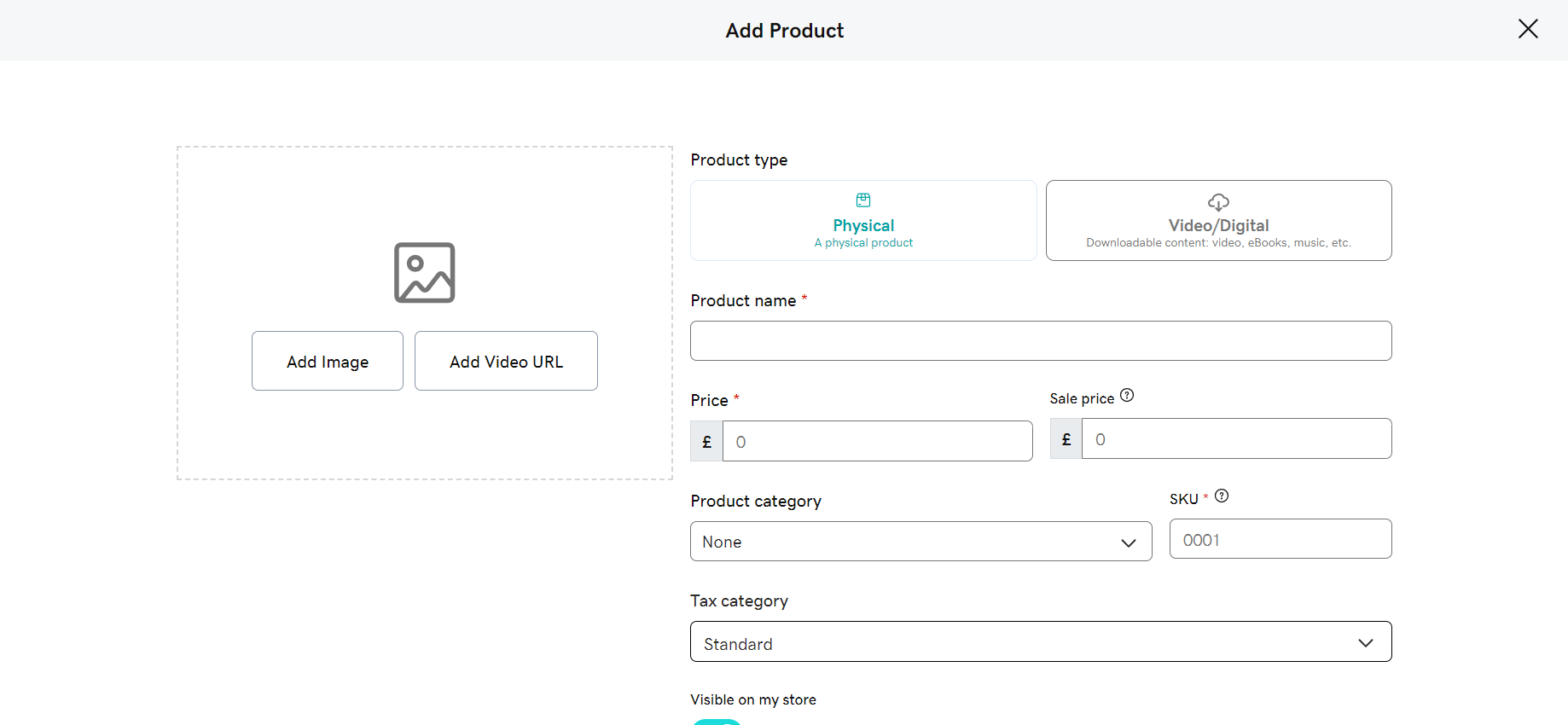
BlueHost ecommerce features:
- Product Listings
- Shopping Carts
- Secure Payment gateways
- Shipping Options and Tax Calculations
- Inventory Management
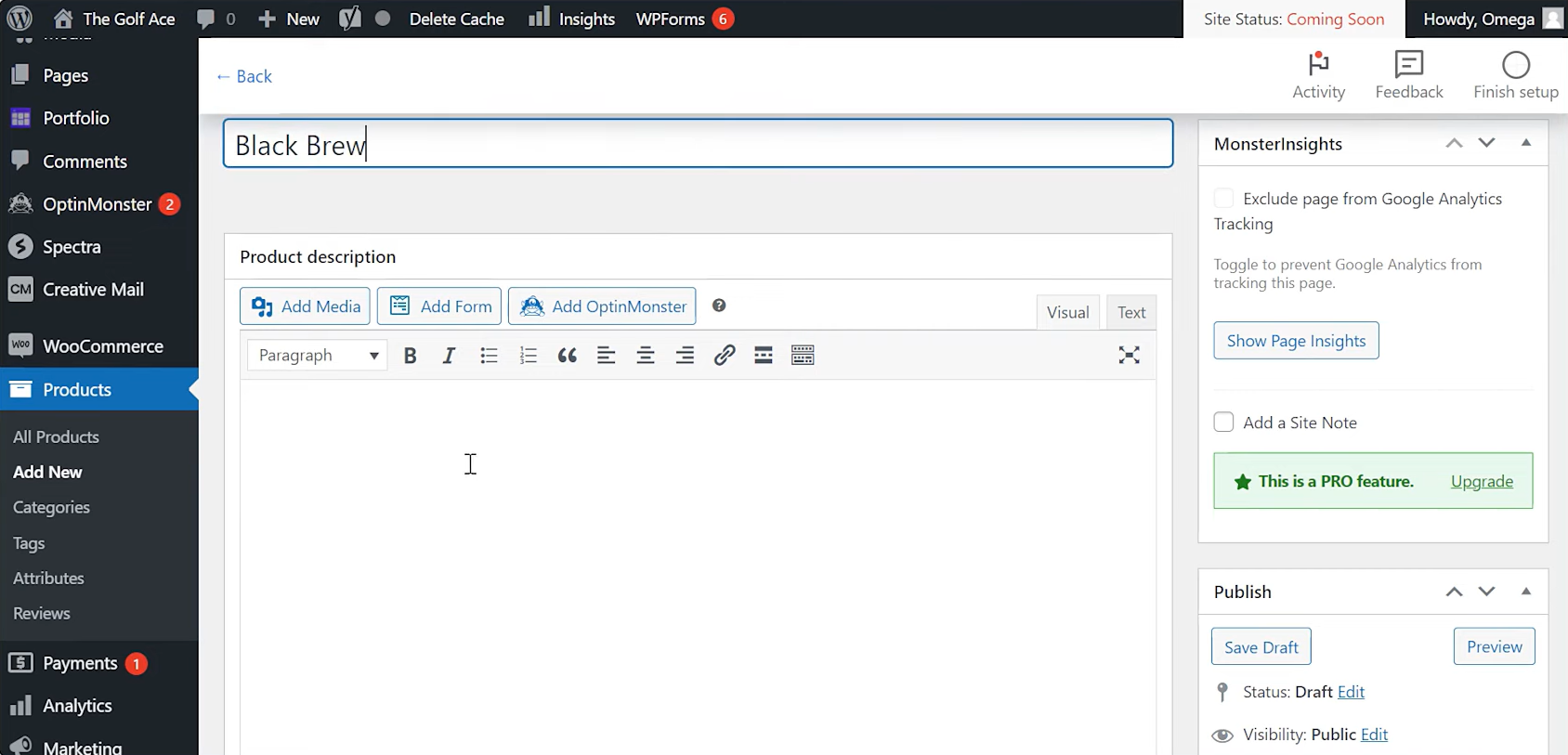
Ecommerce themes & templates
GoDaddy offers around 70-80 ecommerce themes that cover a variety of industries and styles. These themes are generally mobile-friendly and offer basic customization options. However, they may lack the niche variety and cutting-edge designs found on dedicated ecommerce platforms. BlueHost provides a selection of templates optimized for sales, featuring designs that accommodate product galleries, shopping carts, and checkout processes. However, customization options might be limited compared to more specialized ecommerce platforms.
Product page customization
GoDaddy offers basic customization options for product pages, such as editing content, adding images, and adjusting layouts. For advanced customization, coding knowledge is required. BlueHost offers robust customization features for product pages, allowing users to tailor product details like titles, descriptions, images, and pricing according to their preferences. It also supports the creation of product variants and options, and allows for the integration of customer reviews and ratings.
Payment processing
GoDaddy Payments provides a versatile solution for online, in-person, and phone payments with a tiered pricing structure. However, it may lack advanced Point of Sale (POS) features and specific integrations with shopping carts or CRM systems. BlueHost doesn’t directly support numerous payment gateways, but it does integrate with WooCommerce, which facilitates integration with various payment gateways like PayPal and Stripe. However, it lacks Point of Sale (POS) capabilities.
Website Editors
Website EditorsEvaluates the platforms’ website building and editing capabilities.Score Components:
- Customization tools (40%): Range and power of editing features.
- Editor usability (30%): User experience within the editor.
- Design flexibility (20%): Freedom in layout and design changes.
- Update and maintenance ease (10%): Simplicity of updating and maintaining the site.
 6.7
6.7
 7.3
7.3
🏆
Winner: BlueHost
. BlueHost, with a score of 7.3, offers a user-friendly website builder editor designed for both beginners and advanced users. It provides a section-based drag-and-drop interface, a wide range of templates, and customization options. The editor also includes access to stock photos, SEO tools, and responsive design features.
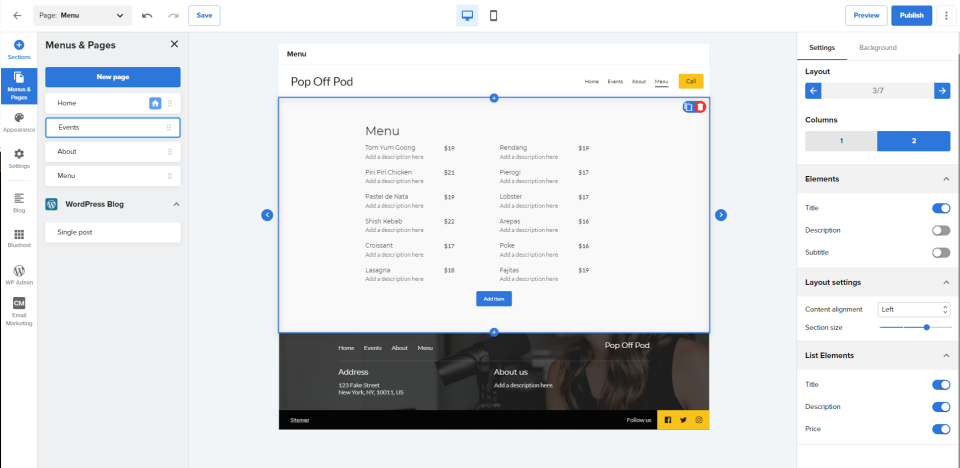
GoDaddy’s editor, scoring 6.7, is a user-friendly drag-and-drop tool enabling website creation without coding. It offers pre-designed templates, a mobile-friendly interface, basic SEO tools, and ecommerce integration. However, it has some design limitations and potentially limited third-party app integrations.
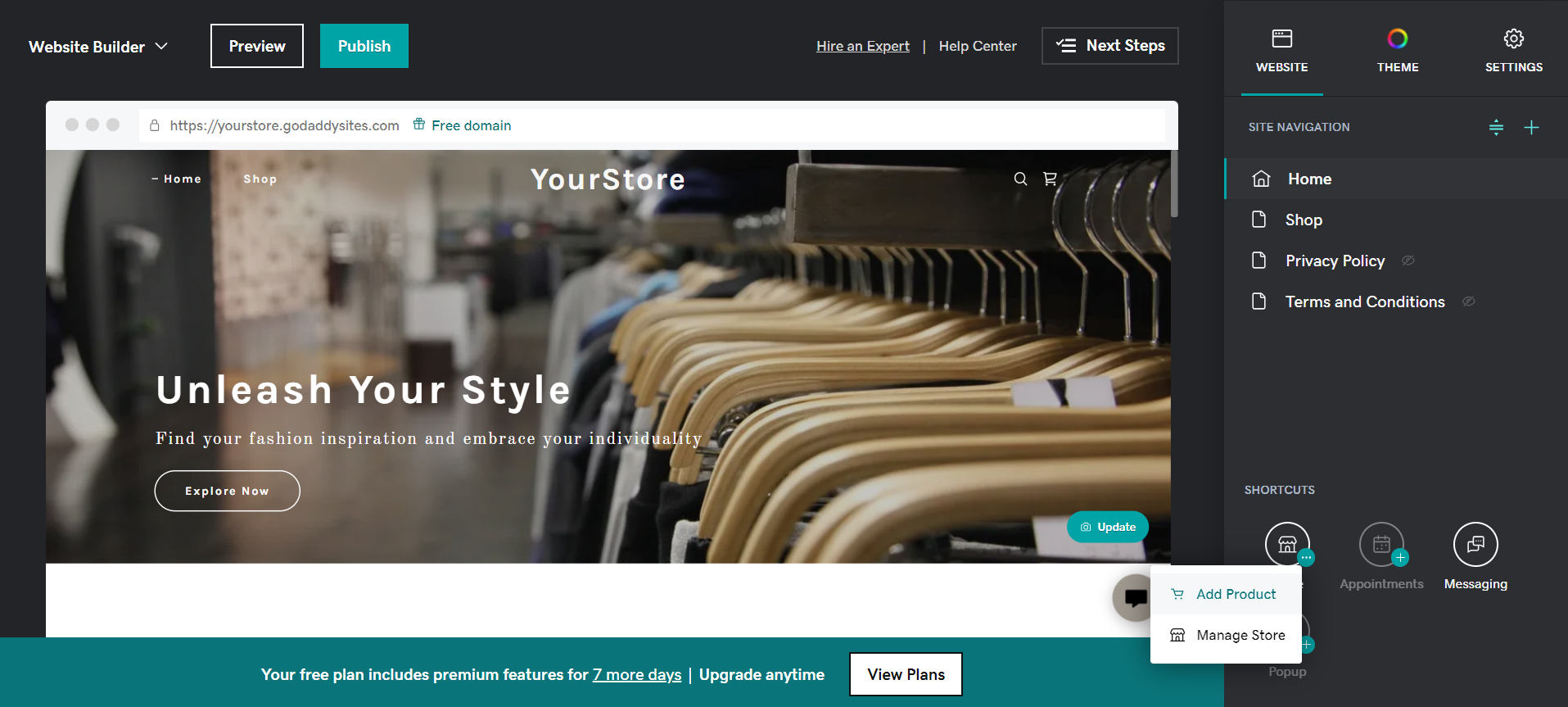
Mobile editor/app
 5.5
5.5
 5.0
5.0

🏆
Winner: GoDaddy
. Both GoDaddy and BlueHost do not offer a dedicated mobile app for editing websites. However, they allow users to log into their accounts and access the website builder through a mobile web browser. The experience might be slightly more constrained on a smaller screen. GoDaddy has a slightly higher mobile editor score than BlueHost, indicating that it provides a slightly better mobile editing experience.
Product testing options
Product Testing OptionsAssesses the options for trying out platform features before commitment.Score Components:
- Trial quality (40%): Extent and usefulness of the trial or free version.
- Feature accessibility (30%): How many features are available to test.
- Trial duration (20%): Length of the trial period.
- Ease of transition (10%): Smoothness of moving from trial to paid plans.
 8.1
8.1
 6.2
6.2
Overall Result
:
GoDaddy wins
. GoDaddy scores 8.1, while BlueHost scores 6.2 in product testing options. GoDaddy offers a free version and a 30-day money-back guarantee, allowing users to explore all features of any paid plan and get a full refund if not satisfied. BlueHost, on the other hand, does not offer a free or trial version, but it does allow testing of premium features within a 30-day refundable period.

|

|
|
|---|---|---|
|
Free Plan |
Yes |
No |
|
Trial Duration |
No (30-day money back guarantee) |
No |
|
Testing Premium Features |
Yes, within 30-day refund window |
Yes, within 30-day refund window |
Price
PriceLooks at the cost-effectiveness and value for money of each platform.Score Components:
- Plan value (40%): What each pricing tier offers.
- Transparency and clarity (30%): Clearness of pricing structures.
- Flexibility of plans (20%): Range of options to suit different budgets.
- Hidden costs (10%): Additional expenses not included in the plan.
 7.9
7.9
 7.2
7.2
GoDaddy and BlueHost offer a range of pricing plans to cater to different needs, with GoDaddy scoring slightly higher in terms of price.
While BlueHost does not offer enterprise plans, GoDaddy provides tailored solutions for larger organizations with advanced requirements.

|

|
|
|---|---|---|
|
Free |
Free ($0/month): Build a basic website with limited templates, storage, and features. Ideal for testing the platform. |
No offering at this amount. |
|
$0-$8 |
Basic ($5.99/month): More templates, custom domain support, email marketing, SEO tools, social media integrations, analytics. Ideal for personal websites and small businesses. Value for price: 6.5 |
No offering at this amount. |
|
$8-$10 |
Premium ($9.99/month): All Basic features + blog, ecommerce with product listings and payments, advanced marketing tools, and analytics. Ideal for businesses with online sales or growing web presence. Value for price: 8.0 |
No offering at this amount. |
|
$10-$18 |
Commerce ($15.99/month): All Premium features + advanced ecommerce tools like cart recovery, discounts, reviews, memberships, and unlimited products. Ideal for businesses with significant online sales and complex product offerings. Value for price: 9.0 |
Basic ($15.99/month): Made for a simple website or blog, 1 website with 10GB SSD storage, Free CDN, Free Domain 1st year, Managed WordPress Hosting, Free SSL 1st year and Chat Support. Value for price: 6.5 |
|
$18-$30 |
Pro ($19.99/month): All Commerce features + priority support, higher bandwidth, website security, and CDN. Ideal for businesses with high traffic and critical online presence. Value for price: 9.5 |
Choice Plus ($27.99/month): Ideal for multiple sites needing storage, security, backups, 3 websites with 40GB SSD storage, Free CDN, Free Domain 1st year, Managed WordPress hosting, Free SSL, Free Domain privacy 1st year, Malware scanning, daily site backups are free for the 1st year with the purchase of a 12 or 36-month package. Otherwise, users are required to pay a one-time fee of $35.88 for backup services. Value for price: 7.5 |
|
$30-$35 |
No offering at this amount. |
Online Store ($32.99/month): Great for all online selling, built-in eCommerce tools, 3 websites with 40GB SSD storage, Free CDN, Free Domain 1st year, Managed WordPress hosting, Free Domain privacy 1st year, Malware Scanning, Exclusive Theme Store, Store Analytics, Unlimited products, Secure Payment options, Bookings & appointments, Shipping labels, product search and filtering, daily site backups are free for the 1st year with the purchase of a 12 or 36-month package. Otherwise, users are required to pay a one-time fee of $35.88 for backup services. Value for price: 8.5 |
|
$35+ |
No offering at this amount. |
Pro ($39.95/month): Perfect for high traffic, advanced storage, security, 5 websites with 100GB SSD storage, Free CDN, Free Domain 1st year, Managed WordPress hosting, Free SSL, Free Domain privacy 1st year, Malware Scanning, daily site backups are free for the 1st year with the purchase of a 12 or 36-month package. Otherwise, users are required to pay a one-time fee of $35.88 for backup services. Value for price: 9.0 |
location. As a result in rare cases the prices displayed here can differ from the ones you see on their
websites.
Hosting quality
Hosting
qualityExamines the reliability and performance of the hosting solutions.Score Components:
- Uptime (40%): Consistency and reliability of website availability.
- Speed (30%): Loading times and performance.
- Bandwidth and storage (20%): Sufficiency of resources provided.
- Data centers (10%): Quality and distribution of hosting infrastructure.
 7.8
7.8
 8.0
8.0
Winner: BlueHost
. Both GoDaddy and BlueHost offer a range of hosting options with a 99.9% uptime guarantee. However, BlueHost edges out with its Managed WordPress Hosting and technologies ensuring fast load times. GoDaddy’s hosting, while comprehensive, may come with potential extra costs and inode limitations.

|

|
|
|---|---|---|
|
Do they offer hosting? |
Yes, included in all of their plans | Yes, offers a range of hosting options |
|
Data Centers: |
Data Centers in USA, France, Germany and UK Cloud Services Through AWS |
6 data centers: Orem and Provo, Shanghai, Mumbai and Hong Kong, London |
|
Type of hosting: |
Shared Hosting, VPS Hosting, Dedicated, WordPress Hosting | Managed WordPress Hosting |
|
Uptime: |
99.9% | 99.9% |
|
Uptime Guarantee: |
Yes, 99.9% | Yes, 99.9% |
Website Speed Optimization
Website Speed OptimizationEvaluates optimization of website loading timesScore Components:
- PageSpeed Score (30%): Google’s score indicating performance optimization.
- Loading Time (30%): The average time until a website is fully interactive.
- Mobile Optimization (15%): Optimization effectiveness for mobile devices.
- Resource Optimization (15%): Optimizing images, scripts, and other heavy resources.
- CDN Usage (10%): Use of CDN to enhance speed across geolocations.
 7.6
7.6
 6.5
6.5
🏆 Winner: GoDaddy
Both GoDaddy and BlueHost prioritize website performance and page speed, but GoDaddy’s comprehensive strategies and infrastructure upgrades give it an edge over BlueHost.

|

|
|
|---|---|---|
|
Focus |
CDN, Automatic Maintenance, Resource Optimization |
CDN, Server Optimization |
|
Performance Tools |
Google Lighthouse, PageSpeed Insights |
Google PageSpeed Insights Integration |
|
Key Strategies |
CDN, Automatic Maintenance, Resource Optimization |
CDN, Server Optimization |
|
Load Times |
Shared Hosting: 2-4 seconds, VPS Hosting: 1-2 seconds, Dedicated Server: 0.5-1.5 seconds |
Varies widely, depending on the optimization, website complexity |
|
Page Speed Scores Range |
Shared Hosting: 50-70/100, VPS Hosting: 70-85/100, Dedicated Server: 80-95/100 |
Varies widely, depending on the optimization, website complexity |
|
Core Web Vitals Improvement |
Infrastructure upgrades, improved server infrastructure and data centers, effective caching mechanisms, image optimization tools, and automatic minification of code files |
Emphasis on LCP, FID, CLS improvements |
GoDaddy has enhanced its platform through infrastructure upgrades, including improved server infrastructure and data centers, resulting in faster loading times. Additionally, the implementation of effective caching mechanisms, image optimization tools, and automatic minification of code files contribute to a smoother user experience and improved Core Web Vital metrics. The website builder features optimized templates and code structures for efficient rendering, further enhancing overall performance.
BlueHost, on the other hand, places emphasis on LCP, FID, CLS improvements. However, both load times and Page speed scores vary widely, depending on the optimization and website complexity. This makes it difficult to provide a consistent user experience across different websites.
Get a head start on website creation with AI
Create a custom website tailored to your business needs 10X faster with 10Web AI Website Builder!
Plugins and integrations
Plugins and integrationsMeasures the range and effectiveness of additional plugins and integrations.Score Components:
- Variety of options (40%): Range of available add-ons.
- Integration smoothness (30%): Ease of integrating plugins into the site.
- Quality of plugins (20%): Functionality and reliability of the options.
- Custom integration capabilities (10%): Support for custom or third-party integrations.
 7.3
7.3
 9.1
9.1
🏆 Winner: BlueHost.
With a score of 9.1, BlueHost outperforms GoDaddy (7.3) in terms of plugins and integrations. BlueHost’s seamless integration with WordPress gives users access to a vast ecosystem of plugins and extensions, significantly expanding the functionality of the website builder. GoDaddy, on the other hand, offers a more limited set of built-in features and premium apps, although it does provide access to the extensive WordPress plugin repository for users of its Managed and Unmanaged WordPress Hosting.
Marketing Features
Marketing featuresAssesses tools and options available for marketing.Score Components:
- SEO tools (40%): Effectiveness of SEO features.
- Marketing automation (30%): Availability and quality of marketing tools.
- Social Media integration (20%): Ease and depth of social media connectivity.
- Email marketing (10%): Quality and usability of email marketing tools.
 7.3
7.3
 7.3
7.3
🏆
Overall Winner: Tie
. Both GoDaddy and BlueHost offer a comprehensive set of marketing tools, with GoDaddy excelling in SEO and analytics, and BlueHost offering robust blogging features through WordPress integration.

|

|
|
|---|---|---|
|
SEO Tools |
|
|
|
Email Marketing |
|
|
|
Blogging |
|
|
|
Social Media Integration |
Tools for social media linking and content sharing |
Yes, through WordPress plugins |
|
Analytics and Reporting |
Basic analytics with more detailed insights on higher plans |
Yes, integration of Google Analytics and other plugins |
|
Ads and Promotions |
Features to create and track online ads, including Google Ads |
Yes, through WordPress plugins |
Customer Support
Customer supportEvaluates the quality and availability of support options.Score Components:
- Response time (40%): Speed of support responses.
- Support quality (30%): Effectiveness and helpfulness of the support.
- Availability (20%): Range of support channels (phone, chat, email).
- Resource richness (10%): Quality of self-help and educational materials.
 8.5
8.5
 7.6
7.6
🏆 Winner: GoDaddy
. GoDaddy takes the lead in this category with a customer support score of 8.5. They offer 24/7 phone support in multiple languages, around-the-clock live chat, and email assistance with responses within 24 hours. Users can also utilize the 24/7 Community Forum and connect through social media channels like Twitter or Facebook. For larger organizations, GoDaddy provides specialized support through avenues like dedicated account managers for personalized assistance in account management, technical issues, and custom solutions.
BlueHost, with a customer support score of 7.6, offers a variety of customer support options available 24/7, including chat and phone support for general inquiries, with specific hours for account verification, renewals, and cancellations. Technical assistance is available from 7 a.m. to midnight EST, seven days a week, via phone or by opening a Help Ticket for email support. However, BlueHost does not provide support for enterprises, which is a significant disadvantage compared to GoDaddy.
Security
SecurityLooks at the platforms’ security measures and data protection.Score Components:
- Data protection (40%): Safeguards for user and customer data.
- SSL and encryption (30%): Implementation of secure connections.
- Compliance (20%): Adherence to industry security standards.
- Regular updates (10%): Frequency of security updates and patches.
 6.8
6.8
 8.3
8.3
🏆
Winner: BlueHost
. BlueHost takes a comprehensive approach to security, offering SSL certificates, regular backups, and additional features like SiteLock for malware scanning. They also provide 24/7 monitoring to promptly detect and respond to security threats, along with malware scanning and removal processes. This ensures a secure and reliable hosting environment for users.
GoDaddy, while offering robust security features like SSL certificates, malware scanning, and web application firewalls, provides limited options for private data storage protection. Users should consider alternative solutions for comprehensive data security beyond the primary focus on web hosting.
AI Capabilities
AI capabilitiesMeasures the effectiveness of AI-driven features and tools.Score Components:
- Automation efficiency (40%): Impact of AI on streamlining processes.
- Personalization (30%): AI-driven customization for users or customers.
- AI-Assisted design (20%): Role of AI in website design and functionality.
- Data analysis (10%): Use of AI in interpreting user data and analytics.
 7.5
7.5
 1.5
1.5

|

|
|
|---|---|---|
|
AI Builder |
|
|
|
AI Ecommerce features |
AI-generated product descriptions, customer service tool, and digital ad creation |
|
|
AI Content Generation |
AI-generated product descriptions, customer service messages, and social media ads |
Supports integration with WordPress plugins for AI content generation |
|
Additional AI features |
|
|
🏆 Winner: GoDaddy
. GoDaddy, with a score of 7.5, utilizes AI mainly to enhance the ecommerce experience and content generation. Its AI features focus on generating product descriptions, customer service messages, and social media ads. While GoDaddy’s AI capabilities are limited, they are more comprehensive compared to BlueHost, which does not have any built-in AI capabilities. However, BlueHost’s support for WordPress plugins allows users to add AI content generation features.
User Management
User ManagementAssesses the platforms’ capabilities in managing user roles, permissions, and accessibility.Score Components:
- Role Customization (40%): Flexibility in creating and defining user roles and
permissions. - Ease of Management (30%): User interface and tools for managing users.
- Access Control (20%): Effectiveness of access control measures for different user
levels. - Scalability (10%): Ability to manage a growing number of users efficiently.
 7.3
7.3
 4.4
4.4
🏆 Winner: GoDaddy
. GoDaddy and BlueHost offer different approaches to user management.
- GoDaddy’s number of users who can edit a website varies based on the hosting plan and website building tool. For Website Builder (GoCentral and Websites + Marketing), the free plan permits one user, while Deluxe and Ultimate plans allow up to five users with full editing permissions. In WordPress Hosting, there’s default support for unlimited users, each with customizable permission levels controlled through the WordPress dashboard.
- BlueHost does support multi user management, however there’s no mention about number of users or their roles and permissions.
GoDaddy User Roles and Access Levels:
| Role | Description | Access Highlights |
|---|---|---|
| Account Holder | The primary owner of the GoDaddy Website Builder account. | Full access to all website builder features, domain management, hosting settings, and account settings. |
| Delegate Access | Users granted permission by the account holder to access specific parts of the GoDaddy account. | Can be given varying levels of access, from managing domains and products to making purchases on behalf of the account holder. |
| Website Editor | Users with permissions to edit and update the website through the Website Builder interface. | Can customize the website, add or edit sections (e.g., image galleries, menus), and update content. |
| Online Store Manager | Specifically for websites with e-commerce capabilities, managing product listings, orders, and payments. | Access to manage the online store, including product listings, coupons, shopping cart, shipping, and payments. |
Additional Features

|

|
|
|---|---|---|
|
SSL Certificate |
|
|
|
Custom Domain |
|
|
|
Free Custom Domain Included |
|
|
|
International Domains |
|
|
|
Mobile Responsive |
|
|
|
Page Speed |
|
|
|
Website Builder Mobile App |
|
|
|
Convert a Website To An App |
|
|
|
Website Analytics |
|
|
|
Multilingual Sites |
|
|
|
Multiple Users |
|
|
User Feedback
GoDaddy users generally appreciate its affordability, reliability, and user-friendly interface, especially when it comes to domain registration and hosting services. However, some users have expressed concerns about occasional interface changes, perceived slowness in website hosting, and dissatisfaction with pricing increases.
On the other hand, BlueHost users value its comprehensive free offerings, including SSL, subdomains, and custom email, along with additional services like free domain registration and CDN. The platform’s intuitive interface and user-friendly website builder cater to both beginners and experienced developers. However, some users have raised concerns about the significant price increase upon renewal, limited free website templates, and unresolved technical issues with poor customer support, which hinders their ability to effectively manage their websites and businesses. Addressing these concerns could enhance overall user satisfaction with BlueHost.
The making of this blog
We followed a clear, step-by-step process to write and research this article.
FAQ
Which platform is better for beginners, GoDaddy or BlueHost?
Can I use GoDaddy and BlueHost for ecommerce?
How do GoDaddy and BlueHost compare in terms of website speed and hosting quality?
Which platform offers better customer support, GoDaddy or BlueHost?
Are there any differences in security features between GoDaddy and BlueHost?
Which platform has better AI capabilities, GoDaddy or BlueHost?
How do GoDaddy and BlueHost handle user management?
What additional features do GoDaddy and BlueHost offer?










